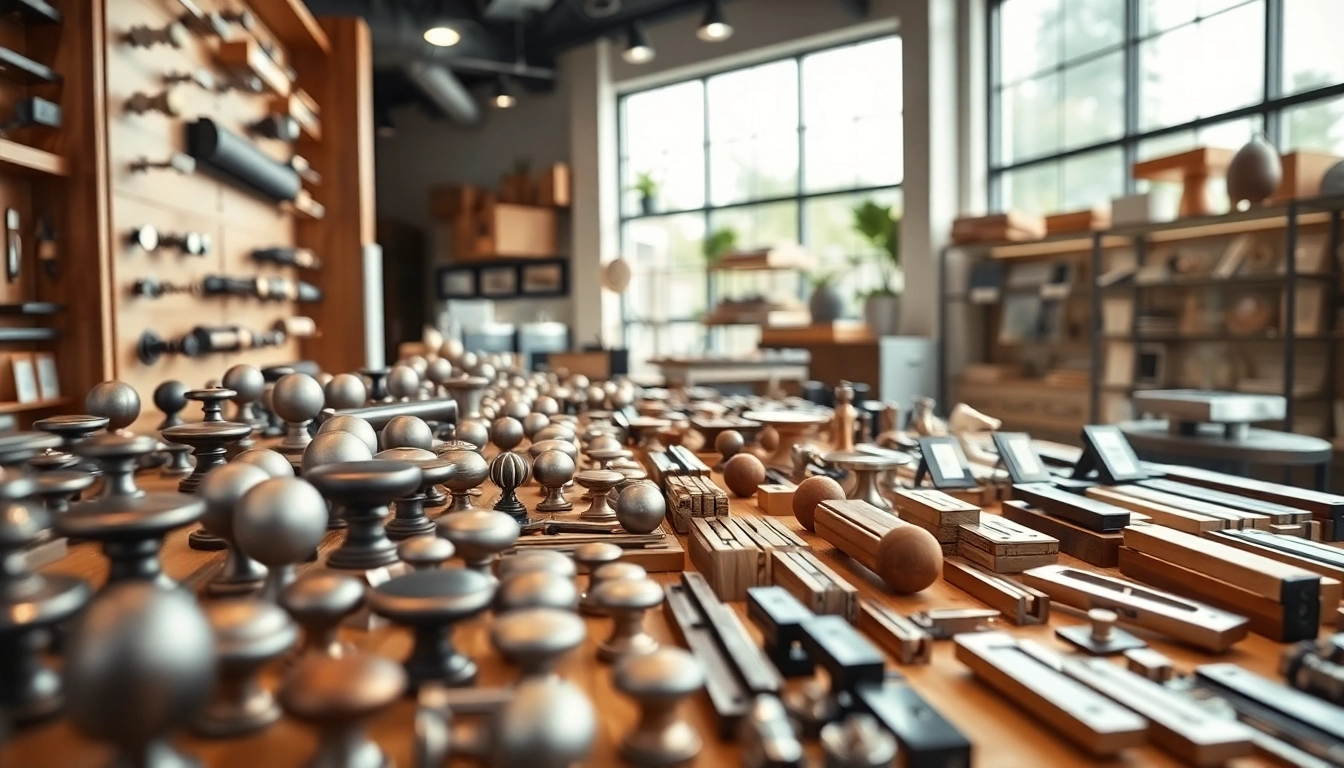
Understanding the Role of Furniture Hardware Suppliers
Furniture hardware suppliers play a crucial role in the furniture manufacturing and restoration industries. They provide essential components that not only enhance the functionality of furniture but also contribute to its aesthetic appeal. From drawer slides to cabinet knobs, hardware elements are the unsung heroes behind every piece of furniture. For those seeking quality and variety, furniture hardware suppliers offer an extensive range of options, ensuring that both manufacturers and consumers can find the perfect pieces for their needs.
What Are Furniture Hardware Suppliers?
Furniture hardware suppliers are specialized distributors that supply various components necessary for the construction, assembly, or enhancement of furniture. These suppliers typically offer a broad selection of hardware, including but not limited to:
- Hinges
- Drawer slides
- Cabinet knobs and pulls
- Catches, latches, and locks
- Table legs and bases
- Furniture connectors and brackets
These components are essential in creating functional, durable, and aesthetically pleasing furniture, and suppliers often provide additional resources such as installation guides, design advice, and customization options to assist their clients.
Types of Hardware Offered
Furniture hardware can be categorized into several types based on functionality and design. Some of the primary categories include:
- Functional Hardware: This includes essential items such as hinges, drawer slides, and fasteners, which are needed for the basic functionality of furniture pieces.
- Decorative Hardware: Knobs, pulls, and drawer fronts that enhance the appearance of furniture, allowing for personalization and style cohesion.
- Specialty Hardware: Items that may be less common but are essential for specific applications, such as sliding door hardware, soft-close mechanisms, and integrated lighting for cabinetry.
By providing various options within these categories, suppliers guarantee that furniture makers can create innovative designs tailored to their clients’ specific needs.
The Importance of Quality in Furniture Hardware
The quality of furniture hardware is critical for the durability and functionality of furniture. High-quality hardware ensures that pieces are safe to use, last longer, and withstand everyday wear and tear. Additionally, quality hardware can contribute significantly to the aesthetic value of the furniture, with beautifully crafted knobs and high-quality finishes that enhance appearance and function.
Furthermore, using quality hardware can prevent costly repairs and replacements down the line. Manufacturers often establish long-term relationships with reliable suppliers to ensure they receive consistent, high-grade materials for their products.
Choosing the Right Hardware for Your Projects
Selecting the appropriate hardware is a fundamental aspect of any furniture project. Whether you’re a DIY enthusiast or a seasoned manufacturer, understanding how to match hardware with design and function is critical.
Matching Hardware with Design Aesthetics
The design components of furniture are greatly enhanced by the choice of hardware. When matching hardware with furnishings, consider the following:
- Style Consistency: Hardware should complement the overall design aesthetic of the furniture. Traditional designs may call for ornate knobs, while modern pieces may benefit from minimalist pulls.
- Finish Choices: The finish of hardware, whether it be brushed nickel, polished brass, or oil-rubbed bronze, should align with other metallic finishes in the room to create a cohesive look.
- Scale and Proportion: The size of hardware must be proportional to the furniture it’s being used on. Oversized handles may not work well on delicate cabinetry and can detract from the intended design.
By carefully curating hardware choices, one can elevate the overall aesthetic appeal of furniture and achieve a polished and professional result.
Functional Considerations for Different Furniture
Different types of furniture require specific hardware to function correctly. Here are some considerations:
- Cabinets: Cabinets often require heavy-duty hinges and durable drawer slides to manage weight and usage frequency.
- Tables: For tables, leg attachments need to be sturdy, and proper hardware is essential for preventing wobbling or instability.
- Chairs: Chair hardware such as brackets and connecting bolts should be reliable to ensure safety and comfort for the user.
Understanding the functional needs of each furniture type enables designers and manufacturers to select the most appropriate hardware.
Popular Trends in Furniture Hardware
In recent years, trends in furniture hardware have evolved, influenced by various factors such as consumer preferences, technological innovations, and sustainability efforts. Here are key trends to watch:
- Minimalism: Many consumers are leaning toward minimalistic designs, opting for sleek and simple hardware that doesn’t overpower the design of the furniture.
- Smart Hardware: With technology advancing, smart hardware that integrates lighting and electronic components is gaining popularity.
- Sustainable Materials: Eco-friendly sourcing and sustainable materials are becoming significant decisions for suppliers and manufacturers as consumers prioritize environmentally conscious practices.
Staying updated on these trends will help manufacturers remain competitive and meet the contemporary tastes and values of consumers.
Evaluating Furniture Hardware Suppliers
Choosing the right supplier can make all the difference in ensuring quality and reliability. Evaluating suppliers involves several critical criteria.
Criteria for Selecting Suppliers
When selecting a furniture hardware supplier, consider the following criteria:
- Product Range: A supplier that offers a wide variety of hardware can often meet diverse project requirements more effectively.
- Quality Assurance: Understand the supplier’s quality control processes to ensure that all products meet industry standards.
- Reputation: Research the supplier’s reputation within the industry, including how long they have been in business and their experience with other manufacturers.
By conducting thorough research on potential suppliers based on these criteria, you can make informed decisions that align with your project requirements.
Comparing Quality and Pricing
While cost is an essential factor, it should not be the sole determining factor when selecting a supplier. A balance of price and quality is key. Factors to consider when comparing suppliers include:
- Bulk Pricing: Analyze any bulk discounts or pricing tiers available to find potential savings.
- Warranty and Return Policies: A good warranty can be a sign of quality assurance and provide peace of mind.
- Sample Availability: Consider suppliers that allow you to request samples before making bulk purchases.
Assessing these elements can lead to better investments in high-quality hardware that will stand the test of time.
Customer Reviews and Testimonials
One of the best ways to evaluate a supplier is through customer feedback. Look for:
- Online Reviews: Check platforms such as Google, Yelp, or industry-specific forums for customer testimonials.
- Case Studies: Some suppliers share case studies demonstrating successful partnerships with other manufacturers.
- Referrals: Ask industry peers for their experiences and recommendations based on their interactions with various suppliers.
Gathering insights from other customers will give you a clearer understanding of what to expect regarding product quality and service levels.
Networking with Furniture Hardware Suppliers
Building strong professional relationships with suppliers can foster better terms and collaborative opportunities. Networking is vital to achieving this goal.
How to Build Relationships with Suppliers
To establish fruitful relationships with furniture hardware suppliers, consider the following strategies:
- Regular Communication: Keeping open lines of communication can help resolve issues quickly and reinforces a professional relationship.
- Feedback and Collaboration: Share your experiences and insights with suppliers; constructive feedback can lead to improved products and services.
- Mutual Support: Supporting suppliers through referrals or positive reviews can enhance your reputation and strengthen your partnership.
By cultivating these relationships, you can gain access to better resources, insights, and potentially exclusive deals.
Attending Trade Shows and Expos
Participating in industry-specific trade shows and expos is an excellent way to network with suppliers. Benefits include:
- Hands-On Experience: Attending shows allows you to physically inspect hardware options and talk with knowledgeable representatives.
- Networking Opportunities: Meeting suppliers face-to-face can establish rapport and build trust.
- Staying Informed: These events provide insight into industry trends and innovations and offer opportunities to attend educational sessions.
Being present at these events can greatly enhance your understanding of the market and the options available.
The Role of Online Platforms in Supplier Connections
In today’s digital age, online platforms are invaluable for connecting with suppliers. Social media, forums, and dedicated industry websites can help you:
- Research Suppliers: Use platforms such as LinkedIn to research suppliers and connect with their representatives.
- Join Professional Groups: Engaging with online communities can offer insights and opportunities to connect with potential suppliers.
- Access Reviews and Feedback: Social media and business platforms allow you to read real-time reviews and feedback from other customers.
Harnessing online tools can streamline your search for quality suppliers and expand your professional network effectively.
Future of the Furniture Hardware Industry
The furniture hardware industry is constantly evolving, shaped by new technological developments, market demands, and environmental considerations. Here are key factors that will influence the future landscape of this industry.
Emerging Technologies in Hardware Manufacturing
As technology advances, manufacturers are adopting new techniques and materials in hardware production. Some notable trends include:
- 3D Printing: This technology allows for rapid prototyping and the production of customized hardware components tailored to specific needs.
- Smart Technology Integration: Hardware that integrates with home automation systems is becoming more common, allowing for advanced features in furniture.
- Innovative Materials: New materials like composites and advanced metals are being developed to produce more durable and aesthetically pleasing hardware.
Embracing these technologies can enhance productivity, improve designs, and meet growing consumer expectations.
Eco-Friendly Hardware Solutions
Sustainability is key to the future of the furniture industry as consumers are increasingly seeking eco-friendly solutions. Hardware suppliers are responding by:
- Offering Sustainable Materials: This includes hardware made from reclaimed wood, recycled metals, and other environmentally friendly materials.
- Implementing Energy-Efficient Manufacturing Practices: Reducing waste and energy consumption during manufacturing processes is becoming a priority.
- Providing End-of-Life Solutions: Suppliers are creating programs for recycling and reusing hardware components at the end of their life cycle.
Focusing on eco-friendly solutions not only meets market demands but also contributes to a healthier planet.
Forecasting Market Trends for Suppliers
The furniture hardware market is evolving, and suppliers must stay vigilant about changes. Anticipated trends include:
- Customization Demand: Consumers are looking for unique pieces, creating a demand for customizable hardware solutions.
- Continued Growth of E-Commerce: Online purchasing platforms will dominate, requiring suppliers to invest in their online presence and logistics.
- Global Sourcing: As businesses seek cost-effective alternatives, suppliers will increasingly look to source materials and components from global markets.
Being aware of these trends will help suppliers adapt their strategies to meet changing consumer needs and stay competitive in the market.







